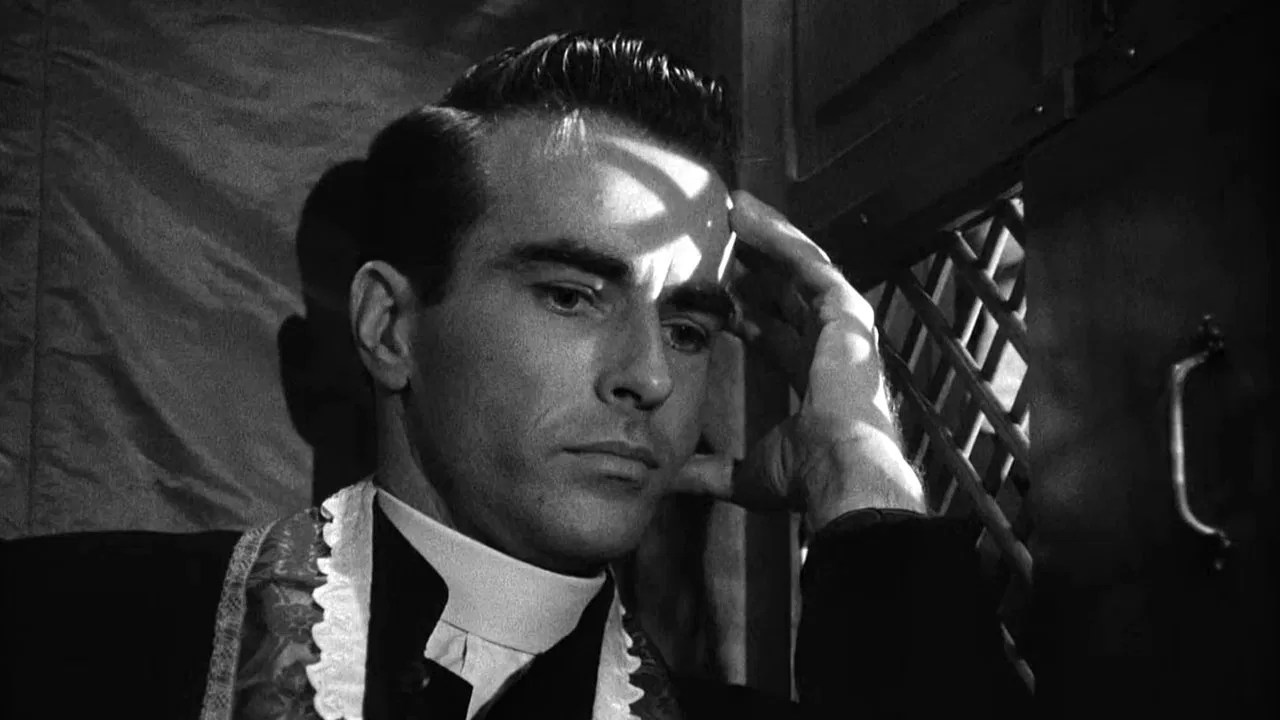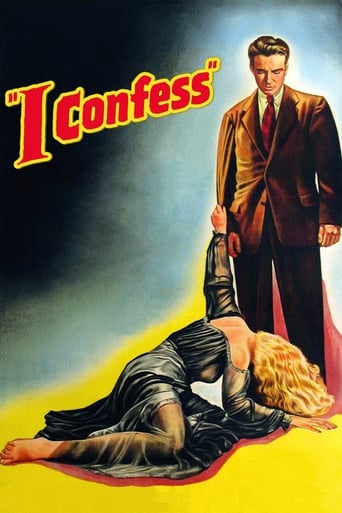

Suspenseful and tense, but from the angle of devotion and duty rather than the usual Hitchcock style. Very well made and Clift pulls off the pained look masterfully. I doubt many people today could relate to the plot, but it worked for its time.
... View MoreI was glued to my seat finally getting to watch "I Confess" from start to finish yesterday on TCM. It's one of the most intricately and densely intertwined portrayal of human morality and tragedy I've ever seen in a movie. AND FROM HITCHCOCK?! Huh?! So he does have a soul and a comforting philosophical view on humanity.The somewhat soap opera style plot is so cerebrally involving and cleverly unfolding in a kind of spiral fashion in the form of a who done it murder investigation. You really do have to follow carefully and listen intently to the dialog because it seems to stray to explain a confession about a past relationship in a maudlin fashion but comes to slap you in the face as it unintentionally makes the wrongly accused appear even more guilty. You will realize in this movie the importance of the Miranda warning (that didn't exist in the '50's) before police interrogation. But strangely in this movie the more the innocent keep quiet the more guilty they appear.And on another philosophical layer the plot shows the results of relying on the frailty of human prejudices against extra marital affairs, religious morality and blackmail as it is steadfastly and stone faced managed by one priest who can keep his mouth shut by becoming the sacrificial lamb in order to honor his convictions of the confession from a poor immigrant who's entire personality crumbles from the guilt like a demon that calls out as it all plays out as a twist at the end that would make even Shakespeare weep. I mean you really don't know in the movie from where the release is coming till the very end. The dialog of the antagonist at the end is gut-wrenchingly sad. This movie also made me realize the power of being invested emotionally from watching a movie from start to finish because in the past I always caught the ending's climactic scene of "I Confess" as some typical '50's B-movie espionage spy flick and didn't give it much thought to watch it the next time I happened to catch at the start. This time I teared up at the very same ending scene.Unbelievable! And from a Hitchcock flick! This IS his best!
... View MoreAlthough I watched a lot of films by Alfred Hitchcock I was unfamiliar with this hidden gem. Between his first golden period in Hollywood (Shadow Of A Doubt, Notorious, Spellbound) and his second (from Rear Window to Birds) Hitchcock experimented with scenery, story and cinematography in films like Rope, The Trouble With Harry, Dial M For Murder and I Confess. After seeing this movie I read the reviews here on IMDb and there is a lot of criticism because the film is too slow and there is less suspense. The only reason here fore I think is in the fact that people watch the movie expecting the typical stuff of the master of suspense. And I Confess is an atypical film by Hitchcock. In the cinematography you see a lot of influence by the expressionists directors and the struggle of Father Logan reminded me of films by Robert Bresson. It is no wonder that I Confess was admired by the directors of the Nouvelle Vague and was more appreciated in Europe than it was in the States. Hitchcock himself didn't like the final result very much. A fact that can be explained because his main aim was to entertain the public. And although he was a great inventor in cinema this film wasn't an easy one to watch as Strangers on the Train for example.The movie starts with shots of public signs mentioning "Direction" and the camera goes through an open window revealing a dead body. You see a person wearing a priest robe leaving the house. Next Father Michael Logan sees the handyman of his church, Otto Keller, who wants to confess. Within the first five minutes of the film you know that it was Keller who murdered lawyer Villette to steal his money and make life for him and his beloved wife Alma easier. Soon the suspicion of the police falls on Father Michael. There are witnesses who saw a man wearing a priest robe leaving the house of Villette and Michael had an appointment with the lawyer he is not willing to explain. Also he has no alibi for the moment of the murder.It turns out that on the evening of the murder he was with his former girlfriend with whom he should have married after the war. In flashbacks we see that Ruth Grandfort was unable to wait for Michael and married politician Pierre instead. The former lovers were caught by Villette near his summerhouse and after that they are blackmailed by the lawyer. In a brilliant twist of fate Ruth tries to give Michael an alibi to the police but instead gives them a motive for the murder.While there are some common themes by Hitchcock in the movie (the wrong man accused, the final shooting) there are also differences from his other films. There is a lot of talking and therefore the pace of the film is slow. The scene of the testimony by Ruth to the police takes up a lot of time but the acting in this scene is very good. Montgomery Clift is a totally different actor than the normal heroes in the films by Hitchcock (Carry Grant, James Stewart). It is mentioned that Hitchcock himself had difficulties with the way Clift portrayed Michael Logan but I found his acting very intense and subtle. Clift made it very believable that Logan was a man who fled to the church after he experienced the horrors of war only to find his beloved Ruth already married. You see a man fighting his inner demons and struggling to keep his oath to the Lord and not tell the confession Keller made to him to the police. Even if it means that he will take the conviction for the murder. There is not only a great role by Clift but all the supporting actors are great. Anne Baxter is convincing as the woman who knows she made a wrong decision as she didn't wait for the great love of her life. I was also impressed by Otto Hasse who plays Keller as a very creepy and schizophrenic murderer who constantly affects the guilt feelings of Michael Logan.So I Confess is a movie that would be a classic if it was directed by anyone but Hitchcock. As it was made by Hitchcock the expectations by the public are such that the film cannot respond. But if you merit the movie on its own you enjoy a real masterpiece.
... View More'I Confess' is carefully construed. It begins straight away with Hitchcock walking through the top of the screen and the signs saying 'direction->', 'direction->', 'direction->', as if Hitchcock is saying: 'Follow me please, and - please again - don't lose me.' At first the emphasis lies with the oath of silence of a priest, but then, with a couple of strategic twists, the viewer is lead to a secret romance (only alive in the hearts of Ruth and Michael), wherein the clever police inspector Larrue begins to suffer from tunnel vision, because Killer, I mean Keller, should not be considered innocent for any policeman, or even a laymen (he finds the victim when visiting him by appointment, ánd he lives under the same roof as Michael, where the bloody piece of clothing is found). But no, he is left alone...I'm assuming Hitchcock let things play out this way on purpose, and thus did not just aim for religion to be considered. When the culminating love story does not turn out to exonerate the main suspect, and a rather dry trial follows. During the trial the evil side of Keller is clearly exposed to the viewer, but he does have his motives; he 'wanted to survive' and he 'did it for his dear wife'. But the next moment he shoots his 'dear wife' in the stomach, just to stay in the clear - and so he gives himself away, finally.Maybe it is an awful lot to process for the viewer, but I found it to be intriguing to see this plot develop. And Hitchcock's direction is a great pleasure to watch, as usual. Quebec, Canada offers a great backdrop for this handsome, clever and compelling film.A big 8 out of 10, and I'm already looking forward to watching it again.
... View More